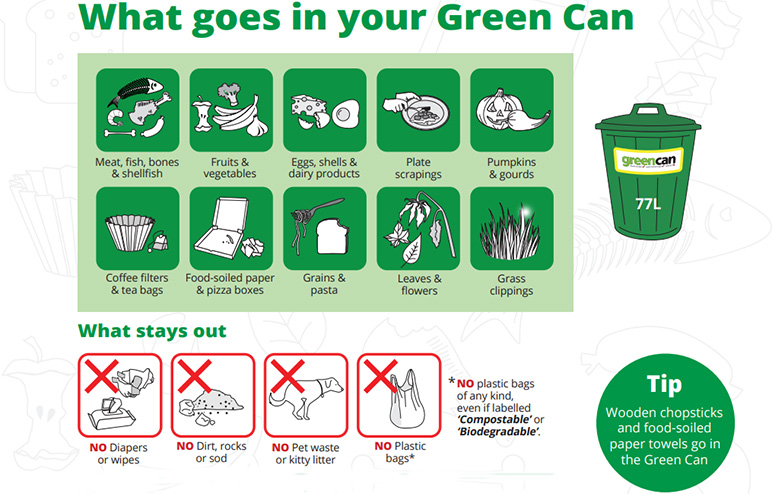Food scraps are 40 percent of our household waste. Organics that end up in landfills produce methane gas, which is 25 times more damaging to the environment than carbon dioxide. When composted, food waste can turn into a valuable nutrient for farming and gardens, so use your curbside Green Can or multi-family Green Bin to dispose of food waste.
Curbside Collection
- Place food scraps, food-soiled paper, and yard trimmings together in a 77-litre can with a lid and a Green Can decal.
- Curbside Green Cans are collected every week by City crews – put them at the curb between 5:30 and 7:30am to avoid wildlife interactions.
- There is a weekly limit of six Green Cans, bags, or bundles, with a maximum weight of 20kg (45lb) each.
- Yard trimmings (but not food scraps) are also accepted in kraft paper bags with folded tops – please keep them dry until collection day.
- Bundle twigs/branches with biodegradable string or twine (no wire, nylon rope, plastic strapping), and place beside – not inside – Green Cans. Maximum bundle size is 1m long and 30cm in diameter, with a maximum branch thickness of 7.5cm.
- Get green waste tips in the City's Curbside Collection Guide.
- Add a backyard composter and skip the Green Can. Composted organic materials turns into nutrient-rich soil you can use to feed your lawn and garden. Metro Vancouver has a helpful Backyard Composting brochure to get you started.
Multi-Family Collection
- For apartments, condos, and most townhomes, place food scraps and food-soiled paper together in your building’s Green bin.
- Most multi-family Green bins don't allow yard waste (e.g. grass clippings, leaves, yard trimmings) – check with your building or strata manager for details.
- Collection day will vary by building – check with your building or strata manager for details.
- Learn more in Metro Vancouver's Food Scraps How-To Guide for Apartments & Condos.

Contacts & Info
Download CityCollect App
Apple store | Google Play
Missed Garbage/Green Can Pickup
Contact City Operations | 604-987-7155
Missed Recycling Pickup / Get Bags or Bins
Contact Emterra Environmental | 778-589-3221 | Email NV.CSR@emterra.ca
Get Green Can decals
Contact City Engineering | 604-983-7333 | Email eng@cnv.org
Recycling Information
Recycling Council of BC
Website | 604-732-9253 | Email hotline@rcbc.ca